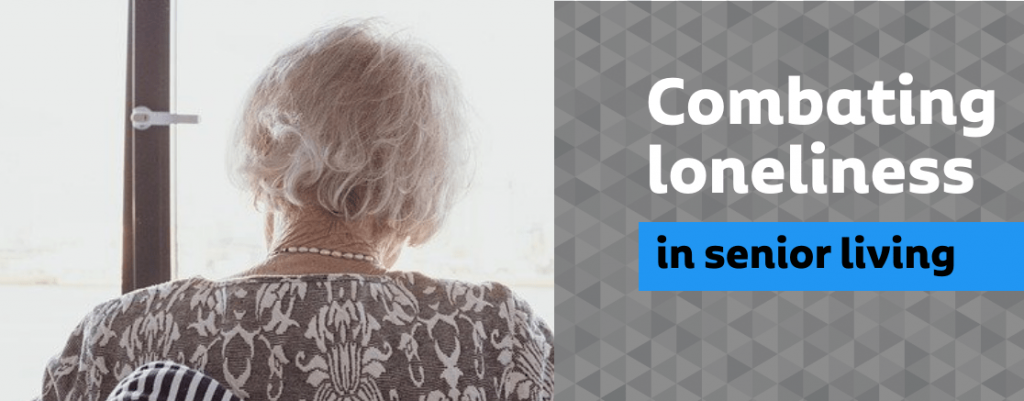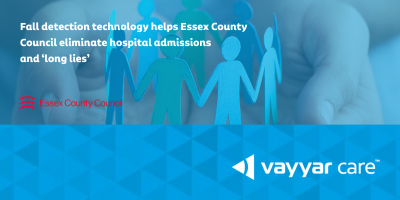Main Menu
Posted by Vayyar
January 4, 2021Impact of Elderly Loneliness and How to Combat It

Humans are social creatures hardwired to enjoy direct person-to-person contact. When this isn’t possible, it’s exceedingly detrimental to our wellbeing. In fact, isolation, especially elderly loneliness, can severely impact physical health and has even been found to be a cause of premature death.
In other words, loneliness kills.
Elderly loneliness impacts longevity
The impact of social isolation and loneliness is a growing problem facing the population at large but especially senior citizens. In a recent study, nearly 25% of adults aged 65 and over were considered to be socially isolated and many of them described being lonely due to loss of a loved one, living far from family, or not having access to transportation.
But how exactly does loneliness affect health? Numerous studies and elderly loneliness statistics show the continuous negative impact. Loneliness has proven to be the cause of many conditions, including:
- anxiety
- depression
- cognitive decline
- dementia, and even
- suicide.
CDC statistics also tell a powerful story about the physical health impacts and how lonely seniors die sooner. For patients with heart failure, loneliness increased the risk of hospitalization by 68%. A lack of social interaction also accounts for a 32% increased chance of stroke.
Together but alone
Loneliness is not limited to seniors living at home. More than one in three retirees who live in assisted living communities say that they are lonely, even though they are constantly surrounded by staff and other residents.
Even more alarmingly, a recent study shows that seniors living in long-term care communities are nearly twice as likely as the general population to be severely lonely.
Loneliness during COVID-19 for seniors
The problem of senior isolation in assisted living communities and nursing homes has only been exacerbated by COVID-19. With many countries going into repeated lockdowns, communities turning away visitors, and group activities being canceled in order to decrease the chances of the virus spreading, social isolation for the elderly is getting worse.
Legislation against elderly loneliness
This problem is so pervasive that lawmakers are taking action.
Recently, a bill was passed in New Jersey requiring communities to have isolation prevention plans in place.
It requires senior living operators to enable religious and recreational activities with other residents, family members, friends and other external support systems, except when restricted or prohibited in very specific situations.
These situations would include periods of lockdown, meaning operators will need more effective ways of monitoring priority 1 residents, both to provide emergency assistance in the event of a fall and to mitigate the impact of loneliness with direct contact – remotely if necessary.
One approach is to embrace new technologies that provide actionable data on vulnerable seniors. High-risk residents, by definition, are the most likely to need intervention, but seniors’ health can change dramatically and rapidly.
Operators need to identify these high-risk residents by constantly monitoring the status of all community members.
How automated wellbeing monitoring can help senior isolation
While the direct impact of COVID-19 has been horrific, especially on seniors, the effects of long-term isolation may be just as dangerous to their health and well-being.
Operators will need to develop methods of understanding who is at high risk of senior loneliness during COVID-19 and attend to them accordingly with additional support.
Vayyar Care is one solution to senior isolation during COVID-19. Vayyar’s technology can identify seniors who are suffering the effects of isolation. Mounted inconspicuously on a wall or ceiling, it passively observes residents without the need for cameras, maintaining privacy at all times.
The radio frequency-powered sensor provides instant fall detection, alerting caregivers when residents fall and cannot get up, as well as rich data about behavioral patterns, such as when residents get into and out of bed, how frequently they leave their rooms, and how often they have had visitors, enabling caregivers to identify signs of depression caused by loneliness in order to make positive interventions.
By providing rich data about resident behavior, nurse call system providers and platform integrators can enable senior living community staff to better serve those seniors who are most in need.
Combating loneliness in seniors
Social isolation for the elderly is a real threat that takes a toll mentally, physically and emotionally on one of the most vulnerable sectors of society.
With the right solutions, operators can not only understand residents’ overall behavior patterns, but also step in to curb the effects of long- term isolation by allowing staff to take timely and effective action to benefit those in their care that need direct attention the most.
To see how Vayyar Care enables caregivers to enhance resident health outcomes, click here.
The Post URL was successfully copied to your clipboard
Read more on #elderly care

20 January 2026
One of the largest single installations of 4D imaging fall detection technology…
Read more
19 January 2026
We’re proud to announce that the Vayyar Care platform has successfully achieved compliance…
Read more
08 October 2024
Recruit, reinforce, and retain should be the mantra of any hiring manager.…
Read more
05 August 2024
We’re living longer, not healthier. Over 95% of people aged 65 or…
Read more


